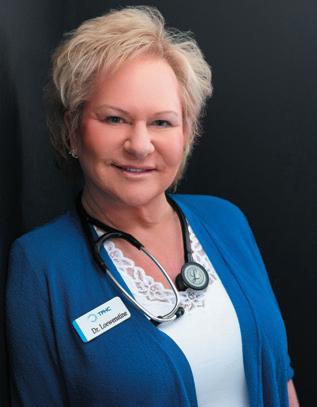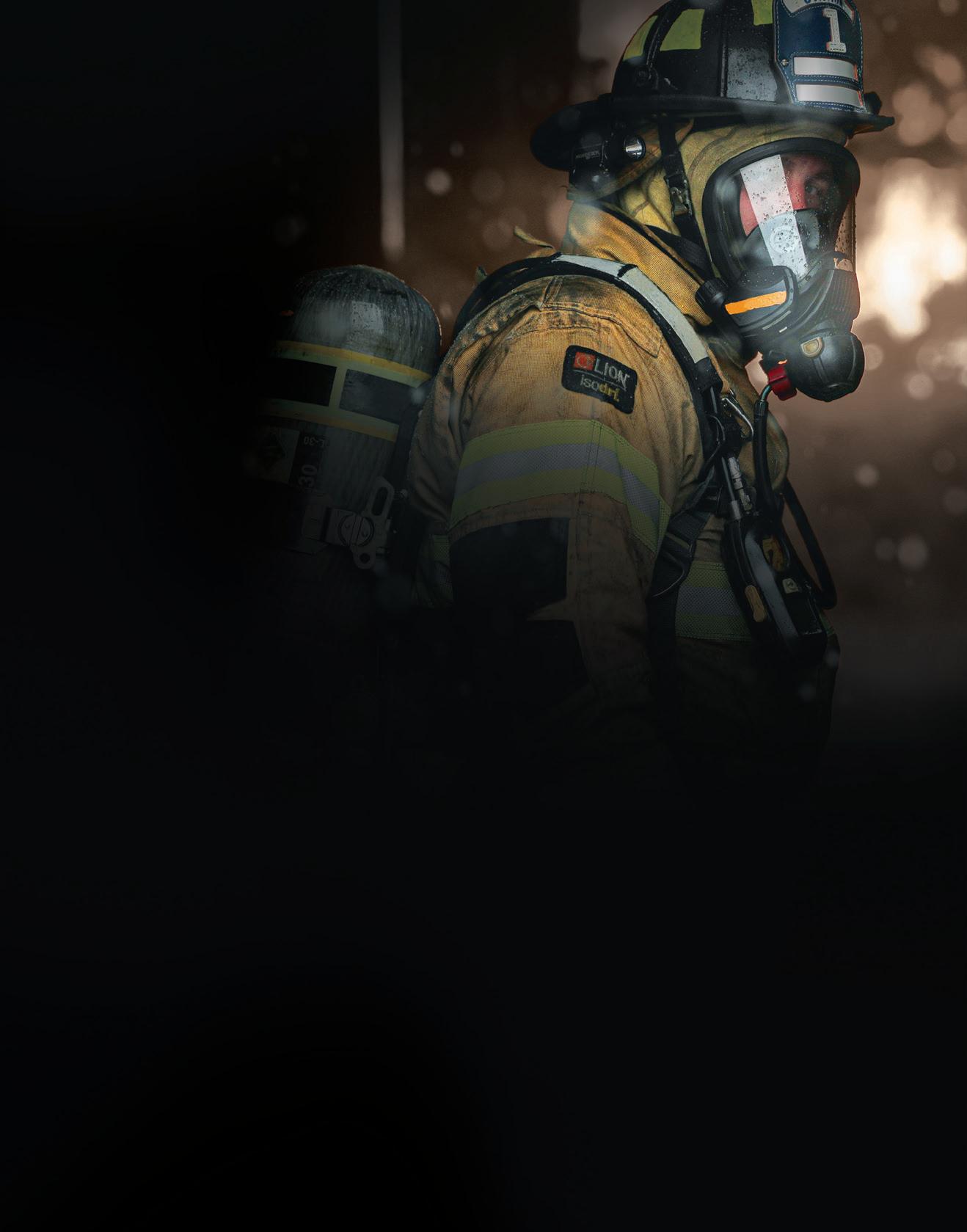
7 minute read
EVER BEEN HIT BY A FLOOD OF TMI?
Have you ever had someone tell you something that was a massive overshare? Way too personal, to the point of making you feel uncomfortable? Something that made you want to yell “Dude…TMI!!!”
WE’VE ALL BEEN THERE.
But, by contrast, we’ve probably also had someone else share similar, very personal information that we’ve been completely okay hearing. Context is everything. It’s all about who you’re with, the nature of your relationship with that person and how important they are to you.
I was lucky enough to take a tour of Kennedy Space Center at Cape Canaveral, Fla. late last year and was fortunate to book a spot on the Launch Director’s tour. The Launch Director, who had retired at the end of the shuttle program, told us that his responsibilities had been to oversee the entire process of launching and returning a shuttle after a mission. He had been the director at the time of the final shuttle launch in 2011, as well as the tragic re-entry break-up of Columbia in 2003. And it was clear to everyone who listened to him that he was still deeply moved by that event. But it was his description of how he approached his work that really got my attention. First, he described his job as making sure the shuttle didn’t launch. In other words, he needed to be beyond satisfied that every aspect of the mission was in place and going according to plan before he would give the final launch order. A part of his motivation was his sense of personal responsibility for each of the astronauts on board any shuttle mission. This responsibility was something he believed was essential to their safety. He knew all the astronauts intimately – their likes, dislikes, their favorite foods and fondest memories. And he knew their partners, children and extended family too. He would spend hours and hours with the families over many months of preparation for a launch, getting to know them in a way very few others in their lives knew them. This deep and intimate connection strengthened in him a sense of responsibility and a desire to do everything in his power to ensure that they all returned to Planet Earth safely.
First responders seem to get this. They share stories about their intimate relationships, their health and the challenges they may be facing, as well as the embarrassing situations they have found themselves in. To an outsider, it might seem like a massive overshare. But is it? And if so, why does it matter?
We’d be smart to wonder what function this behaviour serves, and how we can understand it better.
Why do babies cry, sometimes loud and long? It’s a way of drawing attention to an urgent need they have. Maybe they need food, comfort, pain relief or sleep. When your partner sits quietly in a corner at home, not saying much, it’s easy to dismiss his or her behavior as sulking. But what function might that behavior be serving? There’s a good chance it could be indicating that they need some time and space alone, or – at the other end of the spectrum, that they are signaling a need for more connection or closeness with you. Maybe they are waiting for you to initiate an approach. Don’t you sometimes wish people were more communicative?
So what might be the function of over-sharing? What might it signal? I think it may be a way of saying: “I want you to know me so well that you’ll look out for me.” When we feel closely connected to someone, they matter more to us. When they matter more, we look out for them. If that is the purpose that over-sharing serves, then thinking about it as TMI isn’t helpful. In fact, it’s just the right amount of sharing, and just the right amount of information to make the type of connections that are so important for first responders.
Part of being able to work to the best of your ability as a first responder is knowing that others have your back – in the same way that you have their backs. We can’t have our attention everywhere all the time, so it’s vitally important to know that any danger we haven’t seen could be noticed by someone else who’s looking out for us. Humans are most likely to care for those they’re closest to. If you had one organ to donate and it could go either to your child or to a stranger, who would you select?
If you created a list of things that would help to keep you safe on the job, no doubt you’d include proper PPE, good training, regular drills of skills you must be proficient in, and having a safety conscious mindset. To that, I would add making sure the people you work with know you really well and see you as someone important and valuable in their lives. One of the best ways to do this is to share with them personal things about yourself and your life.
For someone who is not a first responder, it might be TMI. But in the world of first responders, it’s just the right amount.
By Virginia Loewenstine MD, CEO and Medical Director of Tristate Preventive Health Consultants
I HAVE BEEN TOLD I HAVE A HERNIA. WHEN SHOULD I GET THAT FIXED?
Having a hernia repair is considered “elective” (i.e. is not an emergency and can be scheduled in advance) and is done as an outpatient procedure, so you don’t have to stay in hospital. Elective procedures can be done whenever it is convenient for the individual. However, if the hernia becomes painful and the skin in the area turns red and hot, you should go immediately to the ER as this is now considered an emergency.
I AM GETTING READY TO RETIRE AND LOOKING FORWARD TO IT; HOWEVER, I KNOW TOO MANY PEOPLE WHO SEEM TO GIVE UP OR EVEN DIE ONCE THEY’RE RETIRED. ANY SUGGESTIONS?
You made it! Look at your first six weeks of retirement as a vacation. Give yourself permission to enjoy this time! From then on, successful retirement requires having a purpose. Ask yourself what will get you out of bed each morning, whether it’s a type of exercise, pursuing a hobby or volunteering. Take time to reflect and spend time on this. If you have a purpose, you will have a more satisfying retirement.
IS
THERE A LINK BETWEEN LOW TESTOSTERONE AND MENTAL HEALTH?
Yes. More and more studies are supporting this. Low testosterone can occur in both men and women and doesn’t affect just libido. Besides physical conditions that include bone, muscle and hair loss, decreased sperm count, sleep problems and fatigue, low testosterone can also cause mood swings, “brain fog”, and inability to concentrate. Most concerning is that it has been found to cause depression.
Low testosterone can be diagnosed with a simple blood test and more and more departments are adding this to their annual physicals.
I AM A FEMALE FIREFIGHTER AND JUST FOUND OUT I’M PREGNANT. CAN I CONTINUE TO DO MY JOB?
Yes, to a point. It’s best to let your Chief know ASAP and ask him or her for a job description that you can take to your doctor. There’s a good chance you are their first pregnant firefighter and it’ll be your job to educate your OB/GYN doctor on the physical demands of your job.
During a normal, uncomplicated pregnancy, most women are able to work as a firefighter into the second trimester without restrictions. Your doctor will determine when accommodations need to be made. As your baby grows, your center of gravity changes, putting you at risk of injury/falls.
Another factor for your doctor to consider is respirator use. Pregnancy is not a disqualification for respirator use; however, in the event that the respirator fails, exposure to toxins is a concern that should be discussed with your doctor.
HOW DO I HANDLE RECEIVING A SERIOUS MEDICAL DIAGNOSIS? KEEP IT PRIVATE OR NOT? WHO TO TELL? WHY IS IT SO HARD TO TELL PEOPLE ABOUT IT? I FEEL LIKE A FAILURE…
Feeling like a failure is understandable. But it’s far from accurate. Firefighters are responsible for helping others/ strangers and sometimes forget that they’re human too. It is often difficult to tell others and ask for help because the tables are now turned and you are the affected person. This can be very uncomfortable.
It’s your choice who to tell and when, with the exception of your spouse or significant other and your Chief. He/she will need to know because of the medical parameters associated with firefighting. Then start by telling the people in your inner circle and work outward. Realize that they too will be adjusting to what the future may be. If talking to your spouse/significant other feels awkward and you’re uncertain as to what to say, reach out to a mental health provider for guidance. They can be a valuable resource for you and your family, both short and long-term. And never be shy to ask for help, whether it’s getting someone to mow the lawn or take you to medical appointments. People will be more than grateful to have the chance to do whatever they can during this time.
VIRGINIA LOEWENSTINE MD

I HAVE BEEN TOLD THAT I SNORE LOUDLY AND MAY EVEN STOP BREATHING DURING MY SLEEP. SHOULD I BE CONCERNEDAND WILL THIS AFFECT MY ABILITY TO BE A FIREFIGHTER?
What you are describing may be sleep or obstructive apnea (OA), a common condition during which your breathing stops and restarts many times during your sleep. Find out for sure by undergoing a sleep study.
Most initial sleep studies are now done in the comfort of your home with no one observing you, and with a device that allows you to sleep.
Sleep apnea is a big concern for firefighters, both men and women. In addition to daytime sleepiness, OA has been known to have negative effects on the body including increased risk for disease and additional strain on the heart. In the United States, the NFPA1582 recognizes OA as a condition that has to be treated for you to continue as a firefighter. Sleep apnea is easily treated and most people feel much better overall. Because of the negative effects on the body and the number of people who have OA but don’t know it, many fire departments have added Sleep Apnea Screening to their annual physicals.
Virginia Loewenstine, MD, is the CEO and Medical Director of Tristate Preventive Health Consultants. With over 30 years of experience in Occupational and Preventive Medicine, her focus is improving the wellbeing of First Responders with an emphasis on early cancer detection and mental health. She has received many prestigious honors and awards throughout her career. As an educator to Fire Departments, she presents the latest in medical testing and other advances to assist Fire Departments in the design of their annual physical programs. Founded in 2007, Tristate Preventive Health Consultants provides medical consulting, on-site physicals, and medical testing nationwide.
To learn more about Tristate Preventive Health Consultants visittristatepreventivehealth.com
To submit your questions to Dr. Loewenstine, email info@crackylbusinessmedia.com
















